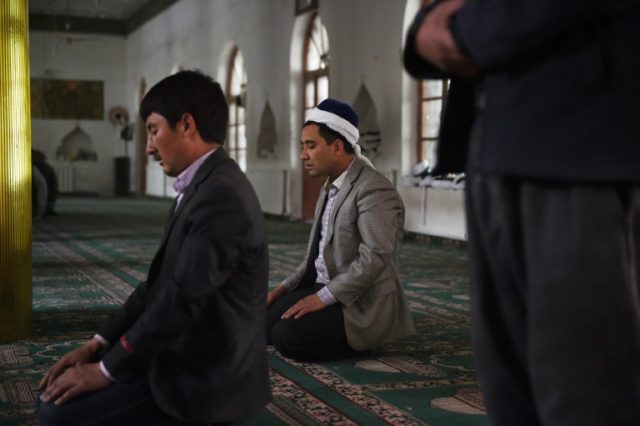A bipartisan group of lawmakers led by Reps. Eliot Engel (D-NY) and Ted Yoho (R-FL) wrote an open letter to Secretary of State Mike Pompeo on Monday criticizing the Trump administration for taking “no meaningful action” to protect the Uighur Muslims from abuse by China.
The letter was directed to Pompeo because he told the House Foreign Affairs Committee in September that his department was considering a request for sanctions against those responsible for oppressing the Uighurs, plus companies that support the mass detention and constant surveillance of Uighurs by providing Chinese officials with the necessary technology.
Some of those companies have ties to the United States, as Engel and Yoho noted in their letter to Pompeo:
Of particular concern are reports of U.S. companies that may be contributing to Beijing’s persecution of Uyghurs through their support or commercial ties to Hikvision and Dahua—two Chinese tech giants that have profited from the surge of security spending in Xinjiang.
As recently as January 31, 2019, Reuters reported that Frontier Services Group, a company established by Blackwater-founder Erik Prince, is constructing a “training facility” in the XUAR [Xinjiang Uighur Autonomous Region].
Although Thermo Fisher Scientific Inc. announced on February 20 that it is halting sales of genetic sequencers in the XUAR, how the company was allowed to sell to a military end user items remains problematically unclear.
These examples demonstrate not just the need to increase public awareness of human rights issues in the XUAR, but also impose consequences on PRC officials responsible and those who enable their abuses. Rhetoric without action will only embolden Beijing.
Thermo Fisher announced two weeks ago that it would stop selling DNA testing equipment to Xinjiang provincial agencies because they were using the equipment to track the movement of Uighurs through their DNA.
The letter, which was signed by several other Republican and Democratic representatives, asked Pompeo whether the administration is monitoring the sale of U.S. surveillance technology, security training, and other resources useful for the mass detention of Uighurs to the Chinese government.
The representatives also asked for details about how the administration plans to rally U.S. allies and confront China over the oppression of the Uighurs.
“This issue is bigger than just China. It is about demonstrating to strongmen globally that the world will hold them accountable for their actions,” the letter concluded.
A State Department spokeswoman responded on Monday that the administration remains “deeply disturbed that since April 2017, the Chinese government has detained more than one million Uighurs, ethnic Kazakhs, Kyrgyz, and other Muslims in internment camps.”
“We will continue to call on China to end these counterproductive policies, free all those arbitrarily detained, and cease efforts to coerce members of its Muslim minority groups residing abroad to return to China to face an uncertain fate,” the spokeswoman said.
China has largely escaped diplomatic or economic consequences for herding the Uighurs into camps and turning their towns into surveillance state nightmares. The Muslim world has been largely silent about the oppression, which reportedly includes direct attacks on Islamic tradition and forcibly “re-educating” Uighurs to believe in communism and President Xi Jinping instead of Allah and Mohammed. Chinese money and political influence are potent enough to persuade the nominal custodian of Islam’s holiest sites, Crown Prince Mohammed bin Salman of Saudi Arabia, to support China’s crackdown.
Only Turkey has spoken out forcefully for the Uighurs, due to a combination of genuine outrage, disenchantment with Chinese economic partnership, the presence of a sizable Uighur population in Turkey, and Turkish President Recep Tayyip Erdogan’s desire to burnish his credentials as a major Islamic authority. Even at that, Turkey has done little beyond verbally criticizing Chinese policy and calling on Beijing to close the camps, a demand Beijing has ignored.

COMMENTS
Please let us know if you're having issues with commenting.